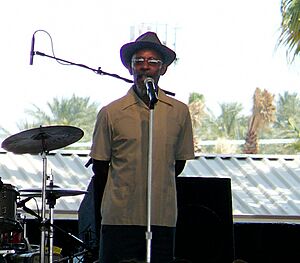Dub poetry facts for kids
Quick facts for kids Dub poetry |
|
|---|---|
| Stylistic origins | Dub - spoken word |
| Cultural origins | 1970s, Jamaica |
Dub poetry is a special kind of performance poetry. It comes from Jamaica and mixes spoken words with reggae music rhythms. Imagine someone speaking a poem, but it sounds like a song because of the beat! It started in the 1970s. People in Kingston, Jamaica, and also in cities like London, England, and Toronto, Canada, helped it grow. These cities have many people from the Caribbean.
A famous artist named Linton Kwesi Johnson first used the name "Dub Poetry" in 1976. Another artist, Oku Onuora, helped make it even more popular. These poems were often heard over reggae beats, especially on the "version" side of vinyl records.
Contents
What Makes Dub Poetry Special?
Dub poetry is different from "deejaying" or "toasting," which is also spoken word over music. Deejaying is usually made up on the spot. But a dub poet's performance is usually planned and practiced.
When a dub poet performs with a band, the music is often written just for that poem. It's not just playing over a ready-made beat. Even without music, dub poets make their words sound musical. They use strong rhythms and dramatic movements. Sometimes, they even add sound effects like echo and reverb to their live performances. Many dub poets also use "call-and-response" to get the audience involved.
Speaking Up: Dub Poetry's Message
Dub poetry is often used to talk about important political and social issues. It's a way for poets to share their thoughts on current events and social justice. Unlike some other music styles, it doesn't usually boast or brag. While you might hear an occasional love poem, dub poetry mostly focuses on serious topics. It shares this focus on "conscious" or "roots" reggae music.
Famous Dub Poets and Their Work
Dub poetry became a major form of black popular art. A very important album was Dread Beat an' Blood by Linton Kwesi Johnson (LKJ), released in the UK in 1978.
After that, Oku Onuora released Reflection In Red in 1979. This was the first dub poem recorded in Jamaica. Then came Revolutionary Tea Party by Lillian Allen and Rasta by Benjamin Zephaniah, both in 1983. Many other great works followed from the early 1980s.
Dub Poetry Around the World
Dub poetry spread from Jamaica to other countries with large Caribbean communities.
In Canada
Toronto, Canada, has a very active dub poetry scene. It's second only to Jamaica in the number of dub poets. Lillian Allen, Afua Cooper, and Ahdri Zhina Mandiela are considered some of the key founders of Canadian dub poetry. The Dub Poets Collective in Toronto organized several dub poetry festivals between 2004 and 2010.
In the United Kingdom
In the UK, LKJ still runs LKJ Records. This company publishes his own books and music, as well as works by other artists.
Benjamin Zephaniah also continued to publish his work in the UK. He wrote novels as well as poetry. He was considered for important poetry roles, like the Oxford Professor of Poetry in 1989. He was also offered an award called the Order of the British Empire in 2003, but he chose not to accept it.
Many dub poets have published their poems both as books and as albums with music.
See also
- Performance poetry
- Caribbean poetry
- Postcolonial literature
- Poetry slam
- Poetry reading
 | Mary Eliza Mahoney |
 | Susie King Taylor |
 | Ida Gray |
 | Eliza Ann Grier |


